Policy Development

The Promise of Adolescence: Realizing Opportunity for All Youth (2019)
Adolescence is a critical period of development which changes in brain structure, function, and connectivity mark adolescence as a period of opportunity to discover new vistas, to form relationships with peers and adults, and to explore one's developing identity. It is also a period of resilience that can ameliorate childhood setbacks and set the stage for a thriving trajectory over the life course.
The nation needs policies and practices that will better leverage these developmental opportunities to harness the promise of adolescence -- rather than focusing myopically on containing its risks.
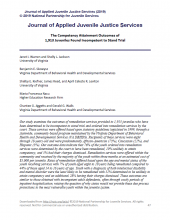
Does Community-Based Remediation for Juveniles Work? Attainment Outcomes of 1,913 Juveniles Found Incompetent to Stand Trial (2019)
Of the 1,913 juveniles who received remediation services in Virginia, 76% of the youth were determined by the court to have been remediated, 19% were deemed unlikely to attain competency, and 5% had their charges dismissed.
Rates of remediation differed based upon the age and mental status of the youth receiving services with 7% of youth aged 8 to 10 years being remediated compared to 44% of those aged 14 to 16 years of age. Moreover, youth with a diagnosis of both intellectual disability and mental disorder were the least likely to be remediated, with 51% determined to be unlikely to attain competency and an additional 28% having their charges dismissed.
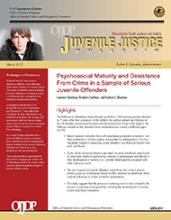
Addressing Issues of Developmental Immaturity (2015)
The Pathways to Desistance study followed over 1,300 serious juvenile offenders for seven years after their conviction and examined the link between psychosocial maturity and desistance from crime among males as they developed from mid-adolescence to early adulthood.
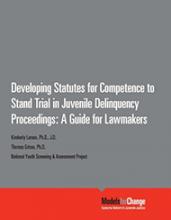
Developing Statutes for Competence to Stand Trial in Juvenile Delinquency Proceedings: a Guide for Lawmakers (2011)
This publication provides a comprehensive review and analyses of the issues central to developing statutes concerning adjudicative competency in juvenile delinquency proceedings. The content includes: research on youths’ capacity as trial defendants; the relevant functional abilities associated with competency; the pertinent procedural issues, including standards of proof and related presumptions; and content of the competency evaluation and report.

Unrestorably Incompetent Youth (2009)
If the court finds that the juvenile is incompetent and is likely to remain so for the foreseeable future, it shall order that the juvenile (i) be committed pursuant to Article 16 (§ 16.1-335 et seq.) of this chapter or, if the juvenile has reached the age of eighteen years at the time of the competency determination, pursuant to Article 5 (§ 37.2-814 et seq.) of Chapter 8 of Title 37.2, (ii) be certified pursuant to § 37.2-806, (iii) have a child in need of services petition filed on his behalf pursuant to § 16.1-260 D, or (iv) be released. If the court finds the juvenile incompetent but restorable to competency in the foreseeable future, it may order restoration services continued until three months have elapsed from the date of the provision of restoration ordered under subsection A of § 16.1-357.
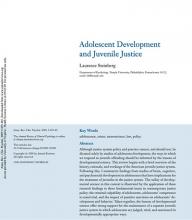
Adolescent Development and Juvenile Justice (2009)
The author recognizes the importance of studies in adolescent development and its help in informing how the justice system responds to juvenile offending. After reviewing the history, rationale, and workings of the American juvenile justice system, the author discusses scientific findings from studies on brain, cognitive,and psychosocial development in adolescence.
Developmental science and its implication for treatment of juveniles in the justice system is organized into three sections of fundamental issues in contemporary justice policy: the criminal culpability of adolescents; adolescents’ competence to stand trial; and the impact of punitive sanctions on adolescents’ development and behavior.
The author justifies how developmental science supports the maintenance of a separate juveniles justice system in which adolescents are tried, judged, and sanctioned in developmentally appropriate ways.
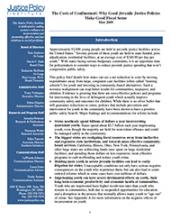
The Costs of Confinement: Why Good Juvenile Justice Policies Make Good Fiscal Sense (2009)
Approximately 93,000 young people are held in juvenile justice facilities across the United States. Seventy percent of these youth are held in state-funded, postadjudication, residential facilities, at an average cost of $240.99 per day per youth. With states facing serious budgetary constraints, it is an opportune time for policymakers to consider ways to reduce juvenile justice spending that won’t compromise public safety.
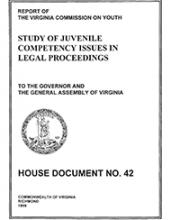
The Beginning of Juvenile Competency in Virginia (1998)
In 1998, the Virginia General Assembly through House Resolution 69, requested that the Virginia Commission on Youth be directed to study the adjudication of competency in juvenile delinquency proceedings. The report was sent to the Governor of Virginia and Members of the Virginia General Assembly and the new laws were enacted on July 1, 1999.
For more information, please contact Janet I. Warren, DSW, Professor of Psychiatry and Neurobehavioral Sciences, Institute of Psychiatry and Public Policy, University of Virginia, [email protected], or 434-924–8305.

